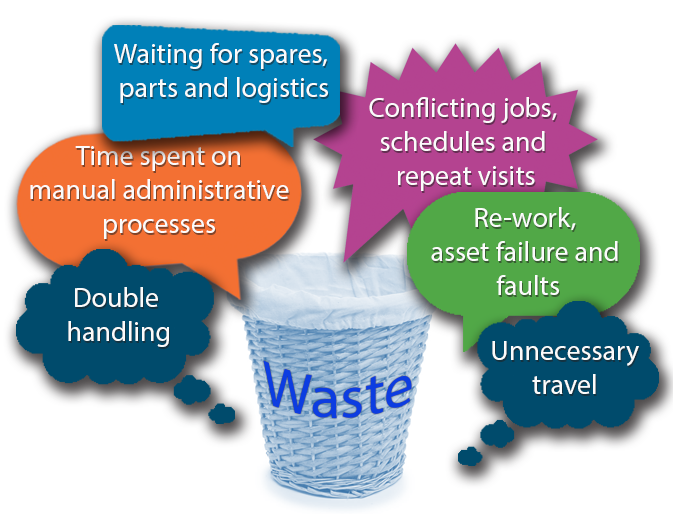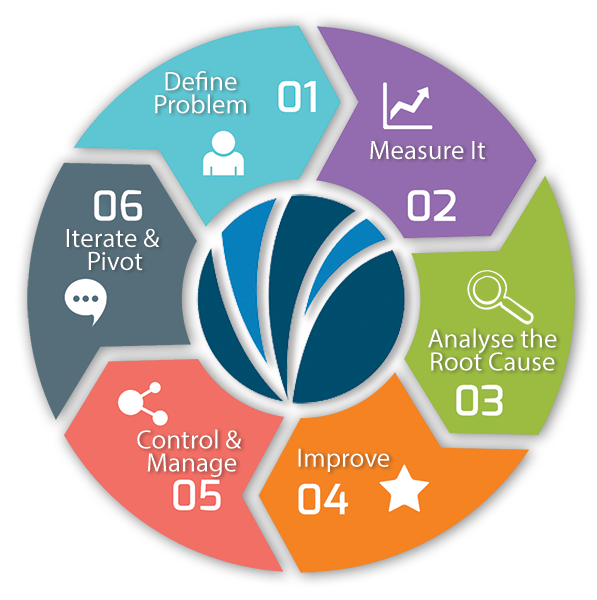Lean and operational improvement principles can achieve significant business benefit, but the path to excellence isn't always smooth. This blog discusses tips to smooth the ride.
Lean, the systematic approach for the elimination of waste within a system or collection of processes, is over 25 years old.
Lean and operational improvement principles can help achieve greater customer focus, ensuring that processes contribute value, improve business performance and productivity. Yet the path to operational excellence isn’t always smooth. In this blog we reflect on why and how to smooth the ride.
The origins of Lean and waste
The fundamental concept of “waste” in production goes back way into the twentieth century (and earlier) with the likes of Henry Ford using the idea of "continuous flow" on the assembly line for his Model T car. He kept production standards tight so that each stage of the process fitted together with each other stage – resulting in little waste. It was then Taiichi Ohno and his colleagues at Toyota who brought together a number of existing working practices to develop the Toyota Production System, which evolved into what we now know as Lean Production.
Since then a host of organisations like Boeing, Nike and GE have applied structured Lean-based business improvement programmes across their organisations to maximise shareholder value by achieving a fast rate of improvement in cost, quality and customer satisfaction. These have tended to focus on reducing waste by streamlining (manufacturing) operations and reducing defects (products or services not delivered on-time or within budget). These programmes rely on a collaborative team effort to improve and sustain performance.
Lean is still growing in popularity and recognition but there are a number of organisations who have struggled to realise the benefits of lean and proved unable to remove waste from their enduring processes. One of the challenges as we see it is that many organisations still maintain groupings of employees, resources and assets that respect functional lines to manage tasks.
The movement of goods and services from one functional unit to the next and the resulting coordination, management and planning handoffs required can introduce significant delays and other forms of waste. Taking a Lean approach aims to align functions and departments along the lines of the value stream. This means that specific working groups and resources are dedicated to performing certain tasks, contributing value to the customer.
If you don’t have time to do it right, you must have time to do it over.
John Wooden
What we mean by value
It's also really important to understand the concepts of "value" and "waste". At its simplest, Lean approaches are based on generating efficiencies and removing wasteful steps in an operation – typically those that don't add value to the end product or service. We’d describe value as:
- Based on customer requirements – Value is subjective, but we find it has to be considered in the context of a value-creating process
- Something the customer is willing to pay for – Put yourself in the "customer’s shoes" to understand the service options that are available to them and the price they would put on this service delivery
- Something that is measurable – Whether it’s being delivered to an internal or external customer, measures will demonstrate the improvements being achieved and the resulting value being created
- Part of an holistic system – Value isn’t usually isolated to one process that runs independently. It’s important to take a broader view to ensure that interactions and value dependencies are understood
Defining value in service-based businesses
We have worked with service-based businesses to apply Lean thinking into their operations and to deliver enhanced value to customers. One of the main differences of Lean Services from Lean Manufacturing is the concept of value demand and failure demand (See Seddon for more on this).
Value demand is typically demand for a product or service, created by the customer when they need something – delivery that satisfies customer wants and needs.
Failure demand is the demand caused by a failure to do something right for the customer and is only really created because initial demand was not sufficiently satisfied. For operations managing complex workforces the impact of failure demand can be significant and add delay, increase cost and erode service quality.
Some examples we come across are:

Why Lean projects fail?
Having been involved in numerous business improvement and transformation projects in a range of sectors, we’ve observed some common reasons why Lean-based operational improvement projects can fail, including:
Assuming one size fits all
There are a number of subtly different approaches to applying Lean – whether Lean Six Sigma, Kaizen, Lean Service Management, Lean Manufacturing and specific Lean approaches for Start Ups, Education and IT. Clearly there is no single right way. Any approach needs to be tailored to the specific business problems, the culture and mindset of each business and adjusted to its individual capabilities and priorities.
Knowing where to look
It can be hard to fully understand waste in a service business as many of the activities can be hard to define and categorise. The use of techniques such as value stream mapping can help to bring out the tacit waste in a process, enabling clearer judgment of the changes that will lead to enduring process improvement.
Efficiency is doing things right; effectiveness is doing the right things.
Peter Drucker
Getting the right management support
As with any change programme the full support of top management and critical stakeholders will be vital to success. Management will need time to understand a Lean-based approach, be sold on its benefits and accept Lean as part of their overall operations and business strategies. Even when quick wins are being achieved it is important to sell the longer term roadmap so they won't be tempted to pull the plug before sustainable results are achieved.
Line managers need to come on the journey
Organisations that are just setting out on a transformation programme can lack the strength and depth of capability required to drive efficiencies. The right training and development will be needed to ensure that line managers understand and play an active role in delivery. Individuals in these roles will need to be willing to accept culture change and act as change agents to measure, analyse and drive benefits. It’s important that improvement activity is facilitated by a range of individuals rather than a handful of subject matter experts who may move on to other projects.
Programmes need to be broken into chunks
Big change projects can require a lot of energy and take time to get off the ground. It’s worth taking a leaf from the Lean Startup Methodology and focus on running smaller Lean experiments and breaking bigger problems into chunks. This will ensure that teams see more immediate benefit and if the original improvements can’t be met it’s better to have failed fast and pivoted than to have spent months getting to a failed solution. Small problems areimportant and are often critical points where a customer-facing process breaks down. In field operations, for example, a lack of flexibility in forecasting and accommodating varying levels of demand can generate processing backlogs that impact work execution, effective prioritisation and generate issues in managing customer expectations along the process.
Lean is about constant ticking, not occasional kicking.
Alex Miller, University of Tennessee
Broadening the focus of Lean
Historically companies have used Lean-based methodologies primarily for operational improvement – improving existing processes to reduce costs, improve operational performance and ensure better customer value. Whilst all of these are really important, we feel there's a missed opportunity if operational improvement programmes only look at improving processes. Organisations need to innovate in all areas of their businesses – operations, products and services, business models and strategies. We feel the principles and tools learned from Lean (an analysis-based collaborative approach to problem solving and customer focus) are perfectly suited to a much broader programme of transformation; one that will drive efficiency and capability across the entire business and help to create a more innovate culture throughout.
Lean on us
Effective projects that apply Lean principles should be collaborations – harnessing the insights and momentum of individuals responsible for managing systems, processes and business practices. Done right they should be about breaking down traditional siloes to focus on value for the customer and the resulting improvements that can be achieved. It is no accident that Lean projects fit so well with service-oriented businesses who have a real focus on ensuring internal productivity and efficiency for maximum customer experience.
Our approach
At Leadent we consider how people, process and technology will work together to transform operations. Asking people to change is where projects become complex and prone to failure and this is where we excel. Typically we help clients to identify many small and tangible opportunities to make operations more efficient, leading to significant overall change and sustainable continuous improvement.

Our Lean-based approach is specifically designed to meet the needs of service-based businesses. We understand the importance of ensuring availability of high-value assets and resources in order to deliver an impactful customer experience.
We apply a flexible set of operational improvement tools to shift the focus on to value, productivity and efficiency. We focus on what our clients want to achieve and we ensure the business benefits are delivered.
We’d love you to lean on us if you’d like our support in improving operations, removing areas of waste and ensuring real value for your customers. Please contact us.

